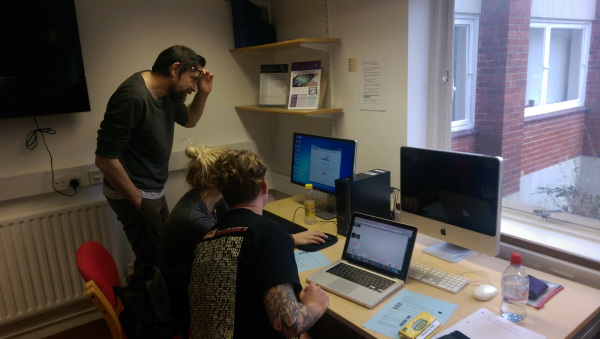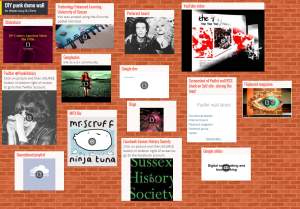Earlier this year the first Sussex TEL Innovation Scheme funded six projects enabling staff to develop or experiment with new tools, resources or teaching approaches with the potential to inform practice in their School or disciplinary area.
Lucy Robinson and Chris Warne (History) received funding for DIY Digital: doing punk online which involved students in the 3rd year Spring term module Post-Punk Britain. Here is the story so far…
The idea
Lucy and Chris’s idea was for the students to use open access resources to build an online seminar on a chosen theme that connects with subcultures or post-punk Britain. The resulting resources will then be shared with students on related courses here and at other institutions.
People and tools
A group of MA students who had taken the module last year were recruited as mentors to support the undergraduate groups. The mentors and tutors then worked with the TEL team to identify tools and platforms that would work for the project and learn how to use them.
Padlet was chosen as a tool for collecting resources because as Lucy says, ‘Padlet was easy to use, pretty much anything could be added to it, it could be edited by multiple users at once, and had various privacy settings.’ It did, however, have limitations when it came to structuring the resulting online seminar. Tozzl was considered for the ‘teaching’ phase, but in the end students ‘went for the looser, messier and more organic option, Padlet. A bit of mess and confusion in the form of the seminar seemed to map onto a lot of mess and confusion in the literature around subcultures.’

Chris Warne and two of the MA mentors, Jimmy and Kasia in the TEL training room, getting their heads around Padlet
What happened
Over a 3-4 week period seminar groups went through a process of:
- Identifying a Topic (the 2 groups chose ‘Moral Panic’ and the ‘Cultural Circuit’).
- Identifying how they would teach it.
- Translating it into social networking tasks, either reusing existing online sources or producing their own.
In the first session students were asked to think about ‘how they already used social networking to facilitate their learning (or get them through the day)’ and a list was collated of their existing skills in this area. They were shown how to use Padlet in the second seminar and tasks to be included in the online seminar were identified. These activities were then ‘matched … with different tools that had been listed in the skills audit for each group; podcasts, timelines, twitter tasks, buzzfeed articles.’ (https://drlucyrobinson.wordpress.com/2015/04/27/diy-digital-first-steps-to-selling-out/)
In the final weeks, groups tested each other’s tasks for usability and clarity before using labels, instructions and directions to give each page some structure.
Students pulled together some really good matches between tasks and digital tools.
They produced a ‘How To’ guide to create and map shares of Buzzfeed articles to look at circulation of online sources.
They used Tiki-Toki timelines to think about the relationship between football disasters, legislation on hooliganism, and academic work on moral panics.
They set up Tumblr pages for users to leave their mark and feed their own discipline into the online resources.
They recorded and uploaded short podcasts of discussions into Soundcloud.
These were particularly useful for academic literature where open access versions of key texts were not available to share. (from Lucy’s blog)
Some lessons learned
Lucy and Chris are continuing to reflect on the project and waiting eagerly for students on other courses to use the resources, but already the experience has produced some really interesting observations.
Despite our common assumptions not all students are comfortable or familiar with everything available to them on the internet. Furthermore, importantly, there is a big difference between ‘using’ a digital tool, and feeling comfortable to create them yourself. (from Lucy’s blog)
Students valued their experience of the project and identified a range of skills that they could talk about if being interviewed for their dream job, including:
- team working
- analytical skills
- teaching and leadership
- research skills – secondary and primary
- follow orders but take initiative
- curatorship and creativity
- applying theory
- the value of being self-motivated
- time management.
Lucy is now beginning to write up the project formally and you can also read more about it on her blog, Now That’s What I call History.




[…] Read the full story by University of Sussex Technology Enhanced Learning Blog […]